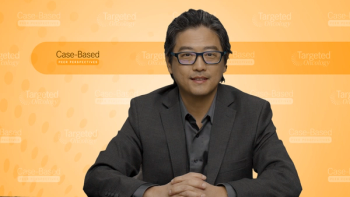Investigators at the National Cancer Institute are evaluating atezolizumab (Tecentriq) as monotherapy or in combination with bevacizumab (Avastin) for the treatment of patients with alveolar soft part sarcoma (ASPS).1
The phase 2 study (NCT03141684), which is being led by Alice P. Chen, MD, aims to enroll 63 patients.
Atezolizumab is an FDA-approved therapy for ASPS and its continued exploration in the clinical trial setting will provide more information of its efficacy, safety, and pharmacokinetics in both pediatric and adult patients.2
“The recent FDA approval for atezolizumab in the metastatic setting is the first checkpoint inhibitor to be approved for ASPS. Actually, it's the first drug specifically to be approved for alveolar soft part sarcoma. It is also the first indication for atezolizumab in pediatrics. Because we were able to collaborate with several pediatric groups, especially the Pediatric Oncology Branch here at NCI, we were able to put pediatric patients on this study and that gave us information regarding activity in that population,” Chen told Targeted Oncology ™, in an interview for the Targeted Talks podcast.
About the Phase 2 Study
Trial Name: A Phase 2 Study of Anti-PD-L1 Antibody (Atezolizumab) in Alveolar Soft Part Sarcoma
ClinicalTrials.gov Identifier: NCT03141684
Sponsor: National Cancer Institute
Recruitment Contact: Alice P. Chen
Completion Date: October 31, 2023
In the study, patients in arm 1 will receive atezolizumab monotherapy via intravenous (IV) infusion over 30-60 minutes on day 1. The treatment cycle will repeat every 21 days until disease progression or unacceptable toxicity. In arm 2, patients will receive IV atezolizumab over 30-60 minutes on day 1 in combination with IV bevacizumab over 30-90 minutes on day 1. Treatment cycles in arm 2 will repeat every 21 days.
The primary end point being explored in the study is objective response rate by RECIST v1.1, and the secondary end points include duration or response, progression-free survival, immune biomarker in paired biopsies, immune-related response, pediatric pharmacokinetics, and anti-drug antibodies. To assess response and progressive disease, patients with undergo biopsies as well as CT scans, MRIs, and blood tests.
“When we designed this trial, the treatment for ASPS was a tyrosine kinase inhibitor [TKI] or pazopanib [Votrient], which had been approved by the FDA for sarcoma in general. There have been some good results, and our clinic did another study with a different TKI that showed activity. However, preclinically, there were some hints that the immunotherapy or checkpoint inhibitors will be active because of the IHC expressions from PD-1/PD-L1 staining, as well as CDA8 cell infiltration of the tumors,” explained Chen, a medical office in the Target Therapeutics 1 Section of the Investigational Drug Branch of the Cancer Therapy Evaluation Program of the NCI.
The study is actively recruiting patients aged 2 years or older with histologically or cytologically confirmed ASPS at the National Cancer Institute Developmental Therapeutics Clinic and the National Institute of Health Clinical Center in Maryland.
To be eligible for inclusion in the study, patients are required to have measurable disease per RECIST v 1.1, unresectable/metastatic disease, an ECOG performance status of 2 or lower, and adequate laboratory values at baseline. Patients cannot be pregnant and must agree to use contraception throughout the study.
The study excludes individuals who were previously treated with any type of therapy within 4 weeks of the start of study treatment, prior treatment with an anit-PD-1/PD-L1 antibody, an investigational drug within 4 weeks, systemic immunostimulatory, and immunosuppressive agents within 2 weeks of cycle 1 in the study. Patients with a history of a central nervous system malignancy and those with infections and certain comorbidities are also excluded.
“There are 2 other unique features about this trial. For those patients that went on study for 2 years and either have stable disease, which means their disease has not changed with a 20% growth of their tumor, or a partial response or complete response, we would allow them the option of going off treatment. We would just follow them every 3 months. There are quite a few patients who went on the drug holiday. The intent was that if they progressed during that period of time, then we would put them back on treatment. The other aspect is that for those patients who progressed, whose tumor had increased by 20%, we gave them the option of going on the combination of atezolizumab and bevacizumab, and those parts of the analysis for those 2 aspects are still ongoing at this time,” said Chen.
REFERENCES:
1. Testing atezolizumab alone or atezolizumab plus bevacizumab in people with advanced alveolar soft part sarcoma. ClinicalTrials.gov. Updated April 18, 2023. Accessed April 26, 2023. https://bit.ly/3mXh3HK
2. FDA grants approval to atezolizumab for alveolar soft part sarcoma. News release. FDA.gov. December 9, 2022. Accessed April 26, 2023. https://bit.ly/3oM4n72



















